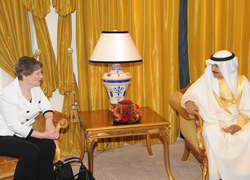
Like many countries in the Middle East, Bahrain is undergoing tensions and changes manifested in the “Arab Spring” uprisings. Bahrain’s monarchy and citizens are engaged working to to determine the future shape of the country’s government through a dialogue centered on acceptable forms of government, citizen participation, and ways to sustain the country’s position as an economic hub in the region. While some engagement is taking place on the streets, international reviews of the government’s actions regarding human rights during demonstrations also play an important role.
In June, as part of the national response to public protests, convened a National Consensus Dialogue to engage representatives from political groups, civil society, the economic sector, and expats in discussing and making recommendations to the monarchy for proposed changes in the country in the areas of politics, rights, economy, and social services. At the request of the government, the Bahrain Chamber of Dispute Resolution (BCDR) secured the services of CDR Associates Partners, Christopher Moore and Susan Wildau, to consult on the dialogue process and conduct a five-day seminar on Facilitation of Multiparty Dialogue Groups. The training program prepared 17 Bahraini nationals to facilitate a 300 person dialogue group and multiple 70-person working groups. The Dialogue presented its report to His Majesty King Hamad bin Isa Al Khalifa at the end of July. In October, the monarchy began its responses to the recommendations.
While the results of the dialogue have not yet resulted in the changes requested by some leading political associations and civil society groups, and there have been questions about the inclusiveness and participation in the process, it has opened a political space for a range of governance, economic and social issues to be raised and addressed and proposal for change to be presented to the government. It is now up to the government to respond.
For more information on CDR’s work with the Bahrain National Dialogue, contact Christopher Moore or Susan Wildau at 1-800-MEDIATE or cmoore@mediate.org.


